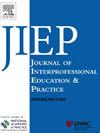Validity evidence for a feedback tool for an interprofessional standardized patient experience: A qualitative pilot study with evaluation of content, response processes, consequences of testing, and feedback quality
Q3 Social Sciences
Journal of Interprofessional Education and Practice
Pub Date : 2025-04-08
DOI:10.1016/j.xjep.2025.100749
引用次数: 0
Abstract
The Interprofessional Standardized Patient Team Experience (SPTE) occurred three times during academic year 2020–2021 and involved medicine, nursing, occupational therapy, pharmacy, and physical therapy students. Teams comprising a mix of these professional students practiced clinical skills with a standardized patient and developed a discharge plan for the patient. Prior to this academic year, student teams had received verbal feedback during a debriefing session at the end of the experience but had not received written feedback, and there had not been a way to verify that the feedback provided aligned with the session objectives. There were few available comprehensive validated tools for interprofessional simulation feedback and debriefing, none of which were ideal for SPTE.
The SPTE Feedback and Reflection Form was developed to address these issues. Our study aimed to provide evidence of validity for the SPTE Feedback and Reflection Form and assess the quality of the feedback provided on the form. Validity evidence was collected using Messick's framework, qualitative data were used to evaluate consequences of testing, and the quality of the feedback was evaluated using a tool for narrative feedback assessment called EFeCT.
Facilitators reviewed course objectives and team development measures prior to the simulations and grouped observed team actions accordingly. Faculty provided specific examples of team behaviors that were aligned with session objectives. Use of the SPTE Feedback and Reflection Form fostered provision of high-quality feedback that addressed interprofessional objectives and prepared students to participate in interprofessional teams in clinical settings. The form is not SPTE-specific and potentially applies to other institutions’ interprofessional simulation activities.
针对跨专业标准化患者体验的反馈工具的有效性证据:一项评估内容、反应过程、测试结果和反馈质量的定性试点研究
跨专业标准化患者团队体验(SPTE)在2020-2021学年进行了三次,涉及医学,护理,职业治疗,药学和物理治疗专业的学生。由这些专业学生组成的团队与标准化的患者一起练习临床技能,并为患者制定出院计划。在本学年之前,学生团队在体验结束时的汇报会议上收到了口头反馈,但没有收到书面反馈,也没有办法核实所提供的反馈是否与课程目标一致。对于跨专业的模拟反馈和汇报,很少有可用的综合验证工具,没有一个是SPTE的理想选择。SPTE反馈和反思表就是为了解决这些问题而制定的。本研究旨在提供SPTE反馈与反思表的效度证据,并评估表格所提供的反馈的质量。使用Messick’s框架收集效度证据,使用定性数据评估测试结果,使用叙事反馈评估工具EFeCT评估反馈的质量。主持人在模拟之前回顾课程目标和团队发展措施,并相应地分组观察团队行为。教师们提供了与会议目标一致的团队行为的具体例子。使用SPTE反馈和反思表促进提供高质量的反馈,以解决跨专业目标,并为学生在临床环境中参与跨专业团队做好准备。该表格不是spte特有的,可能适用于其他机构的跨专业模拟活动。
本文章由计算机程序翻译,如有差异,请以英文原文为准。
求助全文
约1分钟内获得全文
求助全文
来源期刊

Journal of Interprofessional Education and Practice
Social Sciences-Education
CiteScore
1.60
自引率
0.00%
发文量
80
期刊介绍:
Journal of Interprofessional Education & Practice, a quarterly online-only journal, provides innovative ideas for interprofessional educators and practitioners through peer-reviewed articles and reports. Each issue examines current issues and trends in interprofessional healthcare topics, offering progressive solutions to the challenges facing the profession. The Journal of Interprofessional Education & Practice (JIEP) is affiliated with University of Nebraska Medical Center and the official journal of National Academies of Practice (NAP) and supports its mission to serve the public and the health profession by advancing education, policy, practice & research.
 求助内容:
求助内容: 应助结果提醒方式:
应助结果提醒方式:


